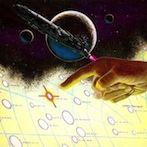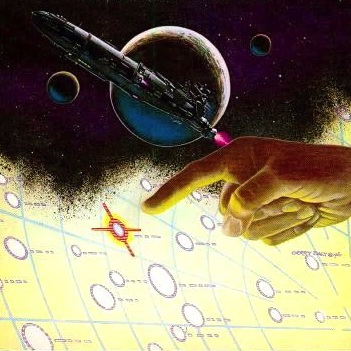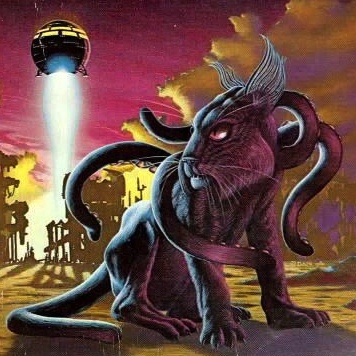November 3rd, 2003
A Unique Time Paradox Story
This is one of van Vogt's most unusual novels, partly because it is the only one that takes place prior to the 20th century. He has done an exceptional job of conveying the period detail and historical facts, particularly the doings and schemings of the English upper classes. The featuring of pirates is another welcome change of pace for van Vogt, and it comes across surprisingly well. The pirates are depicted realistically — dirty and nasty, as they really were — rather than as the swashbuckling, dashing characters of movies and television. This is perhaps best exemplified by the (thankful) total lack of a subplot involving a treasure map!
The naval setting was used only in one other book he wrote, 1966's The Winged Man (written with E. Mayne Hull). In some ways, Cosmic Encounter is like The Winged Man — with vessels from many time periods being brought together and the contemporary humans trying to cope with the situation — but the plot is done properly this time. In the earlier work, the story was something of a convoluted mess and none of the characters were even memorable, much less interesting. Here, Fletcher is one of Van's best characters, and the story is quite engrossing. Also, the historical details are in the foreground, with the science fictional aspects seen through the eyes of 18th century Englishmen. This adds a further layer of realism, as he describes their impressions of outlandish events.
The historical setting also allows van Vogt to display his impressive knowledge of languages, an area of study he devoted much attention to throughout the 1970s. In many places, he has characters speak Low German and Italian, and in one instance he has Fletcher deduce a person's native tongue based on syntactical irregularities when he speaks English.
Against this well-drawn background are the science fiction elements. These are some of the most intriguing and complex ideas he ever worked with. The concept of the timeline collapsing and contracting to a single year is, as far as I am aware, a unique idea. This results in a totally different emphasis than most time-travel stories, which mainly involve the attempts of one group of travelers to prevent another group from altering established history. That is not the case in this book — here, all parties involved know the damage to be permanent, and are concerned only with their own survival. History is not fixed at the end in a tidy and unbelievable way — rather, the time collapse wipes away everything after 1704, leaving a clean slate for history to begin anew and take a widely divergent course than previously.
The idea of having time repeatedly revert to a point in the past — a side-effect of the time collapse — forcing the characters to make different decisions based on their memories of the "last time" they went through events, is absolutely brilliant and one of Van's finest concepts. (A similar premise was used in the 1993 Bill Murray film Groundhog Day, as well as an episode of the TV series Stargate SG-1, "Window of Opportunity.") The way the knowledge of "last time" affects their decisions, and allows them to take different courses of action, is carried through with consistency. Van's treatment of this is so realistic that he has the added touch of portraying the majority of the characters as willfully ignoring these memories, passing them off as bad dreams or idle fancies. That is a masterful stroke, and shows that he had a good understanding of human nature.
I must confess that on my first reading of this novel (several years ago) I had no idea what was going on — and I suspect this is true of many people. If I hadn't sat down to summarize it after re-reading it this time, I don't think it would ever have made sense to me. It is my hope that my summary, and especially the Time Reversal Chart, will help you better understand and appreciate it next time you read it. This novel benefited from being summarized far more than Renaissance did — for one thing, a casual reading reveals a rather uneven plot, while closer examination reveals an intricate and carefully constructed time paradox story that takes full advantage of its historical setting. Renaissance, on the other hand, remained shallow and appallingly lousy even after an astute examination. Incidentally, I enjoyed writing this summary more than any of the others, and found myself unable to constrain my personal comments to a mere paragraph or two.
There is a great deal more humor in this novel (and all of his post-1980 work) than in most of his books, and added quite a lot to the enjoyment of the story. The previous novel that made the most of its humorous potential was 1974's The Man with a Thousand Names. But his seldom-displayed sense of humor better shows itself in this novel — and to an even greater degree in 1983's Computerworld — perhaps indicating that his relationship with Lydia which resulted in their marriage in late 1979 restored to him a more cheerful outlook on life, an attitude he lost when his first wife Edna died in 1975. The resulting prolonged depression produced such bleak books as Pendulum (1978) and Renaissance (1979), and it is only with this novel that the humor returns. Tellingly, this book is dedicated to Lydia.
And speaking of Renaissance, Captain Fletcher is an astounding turnabout from that novel's main character, Peter Grayson. As a matter of fact, Abdul Jones — the sniveling, womanizing weasel of a man who tries to rape Patricia in this book — comes across as a carbon copy of Grayson, merely with a different name and thrown into the 18th century! That van Vogt returned to a more likable and stronger protagonist I think also reflects his newfound optimism. Fletcher is also a better developed character, and his slow but sure change from a ruthless pirate captain who murders the heroine, into the resourceful and honorable hero is wonderful to watch, and is done with great conviction and believability. Indeed, the whole book naturally converges to a very pleasant resolution, whereas the "happy" ending to Renaissance seemed forced and artificial.
In most of his other books, van Vogt throws his characters into these bizarre situations and they deal with them in a straightforward and serious manner. Here, he takes the time to treat the surreal elements — people having memories of alternate realities, and characters returning from the dead — with an occasional dose of humor. The best example of this is the opening paragraph of Chapter 26, where Fletcher is thinking about his odd circumstances:
"Logically, there is nothing a man can say to a woman whom he has drown. And who, to all intents and purposes, is now alive again, rescued accidentally in a way that gives him no credit for good will."
Another excellent example is in Chapter 36 after he addresses the Lantellans, pretending to be their Universal Mind:
"After he had finished, Fletcher had the grimly amused feeling that he could become an instructor in how gods should speak to robots. [...] He had the wry feeling, however, that it would never become a credit course in any university."
Overall, though this is a rather difficult book to understand, it is one of his most fascinating, original, and (surprisingly) humorous stories, which I highly recommend to anyone who is willing to put the extra effort into an attentive reading. I read it very slowly, a chapter each night at bedtime — an ideal time and pacing for this challenging novel.








